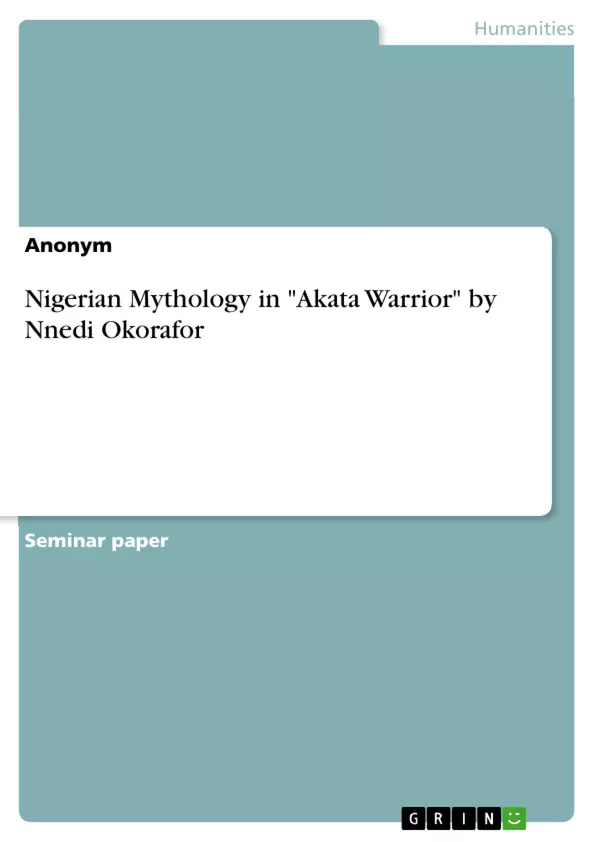"Akata Warrior" is the sequel to the young adult fantasy novel "Akata Witch". Where "Akata Witch" has its focus on the construction of a fascinating world based on Nigerian mythology. "Akata warrior" further expands this magical world, with many of the creatures and concepts being familiar with Nigerian and other West African stories.
The theme of the story is that the power and strength to overcome obstacles lives within oneself. Sunny Nwazue, who is the protagonist of the book, is a Nigerian American who not only suffers from albinism but is also a member of the Leopard society. Due to her membership in this group, she can use her albinism as the key to her power. Her membership also introduces her to a whole new world, full of mystical events and creatures. A walk through Nwazue’s story in "Akata Warrior" reveals a unique and intricate network of allusions and inclusions of creatures and concepts from Nigerian mythology.
Table of Contents
- Background
- Nigerian Culture
- Daily Activities; Danfo, Okada, and the Kola Nut
- Discrimination: The Akata and Albinism
- Confraternities
- Nigerian Mythology and Folklore
- The Concept of Juju
Objectives and Key Themes
This text explores the cultural and social context of Nigerian mythology as depicted in the young adult fantasy novel "Akata Warrior." It examines how the novel incorporates elements of Nigerian mythology and folklore into its narrative, shedding light on the complexities of cultural identity, discrimination, and the spiritual world within Nigerian society.
- Nigerian cultural practices and traditions
- The role of mythology and folklore in shaping cultural identity
- The impact of discrimination and prejudice on individuals and communities
- The exploration of the spiritual world and its connection to the physical reality
- The representation of the "Akata" identity and its implications for American-born Nigerians in Nigeria
Chapter Summaries
The text examines how the novel "Akata Warrior" draws upon Nigerian culture and mythology to create its fantastical world. The first chapter analyzes the use of everyday objects and activities, like the "Danfo" bus, "Okada" motorcycles, and the Kola nut ceremony, to illustrate the everyday realities of Nigerian life and their cultural significance. The second chapter investigates the themes of discrimination and prejudice experienced by the protagonist, Sunny, due to her "Akata" identity as a Nigerian American and her albinism. It explores the cultural beliefs associated with albinism and its portrayal in the novel. The third chapter delves into the topic of confraternities, student groups resembling secret societies, and their prevalence and impact on Nigerian society, drawing parallels between the fictional depiction and real-world issues. The final section of the text focuses on the concept of "juju," which is presented as a form of magic or mysticism, exploring its role in the novel's narrative and its relationship to the spiritual dimension.
Keywords
The text explores key topics such as Nigerian mythology, cultural identity, discrimination, spiritual world, "Akata" identity, albinism, confraternities, and "juju." It delves into the intersection of these themes within the context of the novel "Akata Warrior," examining their cultural significance and impact on the narrative.
Frequently Asked Questions
What is the central theme of "Akata Warrior" by Nnedi Okorafor?
The central theme is that the power and strength to overcome obstacles live within oneself, explored through the magical journey of the protagonist, Sunny Nwazue.
Who is Sunny Nwazue and what makes her unique?
Sunny is a Nigerian American girl with albinism who discovers she is a member of the Leopard Society, a secret group of people with magical abilities.
How does the novel incorporate real Nigerian culture?
The book features everyday Nigerian elements like "Danfo" buses, "Okada" motorcycles, and the cultural significance of the Kola nut ceremony.
What does the term "Akata" mean in the book?
"Akata" is a derogatory term used in Nigeria for Black Americans or foreign-born Nigerians, reflecting the theme of discrimination and identity struggles Sunny faces.
What is "Juju" in the context of the story?
In the novel, Juju is presented as a form of magic or mysticism rooted in West African folklore, connecting the physical world with a spiritual dimension.
What are "confraternities" in the Nigerian context?
Confraternities are student groups resembling secret societies that are prevalent in Nigerian universities, which the novel uses to explore real-world social issues.
- Citar trabajo
- Anonym (Autor), 2022, Nigerian Mythology in "Akata Warrior" by Nnedi Okorafor, Múnich, GRIN Verlag, https://www.grin.com/document/1377722



